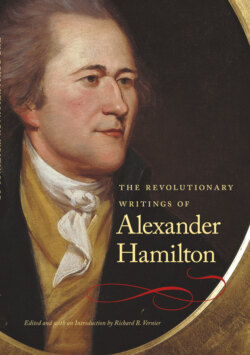Читать книгу The Revolutionary Writings of Alexander Hamilton - Hamilton Alexander - Страница 10
На сайте Литреса книга снята с продажи.
ОглавлениеON OCTOBER 14, 1774, the Continental Congress issued its Declaration and Resolves in response to Parliament’s legislative retaliation for the Boston Tea Party. The Coercive Acts, as they came to be called, were four-fold: The Boston Port Act shut the Boston Harbor to all ocean traffic; the second act made the Massachusetts Council appointive and limited town meetings; the third allowed royal officials charged with capital crimes in the colonies to be tried in England; and the fourth authorized the quartering of troops in Massachusetts homes. The Congressional Resolves affirmed colonial rights to life, liberty, and property; the right of “all natural-born subjects within the Realm of England” to participate in legislation; the inability of Parliament to represent the colonies; and the sanctity of immunities and privileges bestowed by royal charters or provincial laws. Americans would not submit to violations of their rights, the Congress declared, and would, in response, enter into a “nonimportation, nonconsumption, and nonexportation agreement or association.”
The Reverend Samuel Seabury, an Anglican priest in Westchester, New York, using the pseudonym “A Westchester Farmer” (a dig at the famed patriot pamphleteer of the previous decade “A Pennsylvania Farmer”), published an attack on the Congressional Resolves. It appeared first in James Rivington’s newspaper, the New York Gazeteer, and later was republished as a pamphlet, Free Thoughts on the Proceedings of the Continental Congress (New York, 1774). Castigating the nonimportation association as a “brood of scorpions,” he charged Congress with acting illegally, recklessly exposing farmers to economic ruin, and the colonies to the threat of war. Seabury’s arguments were widely seen as a blow to the patriot cause.
Alexander Hamilton had recently entered King’s College in New York City. The president of the college, Dr. Myles Cooper, himself an Anglican, was an ardent Loyalist, as was a sizable portion of the city. Notwithstanding his tutelage by Dr. Cooper, Hamilton had by the summer of 1774 begun to speak at the liberty pole erected by the New York Sons of Liberty and published his response to Seabury on December 15, 1774.*
